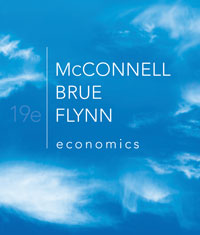1 A) Mainstream view B) Real business cycle theory C) Rational expectations theory D) Monetarism 2 A) the economy will self-correct only slowly, if at all B) the natural rate of unemployment will fall during a recession C) the Phillips curve will be vertical D) work-place morale can be improved with "two-tier" wage systems 3 A) wages are inflexible downward B) coordination failures lead to persistent unemployment C) the long-run aggregate supply curve is vertical D) the long-run Phillips curve is downsloping 4 A) 5 B) 4 C) 4.5 D) $1000 5 A) changes in money velocity are small and predictable B) velocity is inversely proportional to nominal GDP C) the equation of exchange holds true only at full-employment GDP D) adverse supply shocks are the primary cause of monetary instability 6 <a onClick="window.open('/olcweb/cgi/pluginpop.cgi?it=jpg::::/sites/dl/free/0217511447/883764/ch36_q6.jpg','popWin', 'width=NaN,height=NaN,resizable,scrollbars');" href="#"><img valign="absmiddle" height="16" width="16" border="0" src="/olcweb/styles/shared/linkicons/image.gif"> (14.0K)</a> LR1 to ASLR2 :A) would be caused by the decrease in aggregate demand from AD1 to AD2 B) would lead to a subsequent decrease in aggregate demand from AD1 to AD2 C) would cause a drop in resource prices and lead to a subsequent return to the original aggregate supply curve D) could never happen 7 A) are always anticipated, and as such, have no effect on real output B) are never anticipated, and as such, have no effect on real output C) have no effect on real output if they are fully anticipated D) have no effect on real output if they are unanticipated 8 A) cannot occur if demand shocks are fully anticipated B) is a direct outcome of failed macro policies C) can occur if everyone expects everyone else to curtail spending D) is typically caused by adverse aggregate supply shocks 9 A) changes in the money supply B) adverse productivity shocks C) changes in investment spending D) changes in fiscal policy 10 A) the economy will eventually self-correct B) the velocity of money is unstable C) a gradual adjustment of expectations as events and experience unfold D) an almost instantaneous adjustment of expectations in response to announced changes in policy





